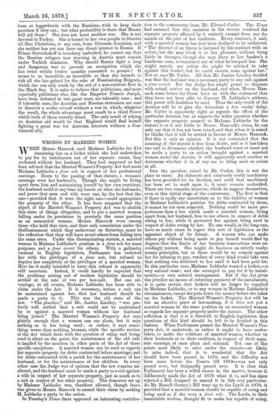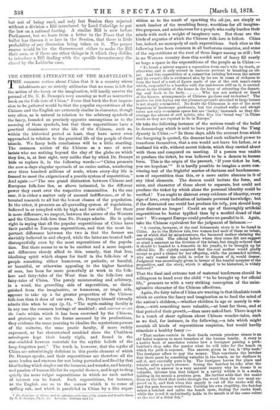WRONGS BY MARRIED WOMEN. AV HEN Messrs. Hancock sued Madame Lablache
for £14 remaining due on a locket which she had undertaken to pay for by instalments out of her separate estate, they reckoned without her husband. They had supposed or had been advised that the Married Women's Property Act had made Madame Lablache a feme sole in respect of her professional earnings. Down to the passing of that statute, a woman's earnings were her husband's. Though she might be living apart from him and maintaining herself by her own exertions, the husband could at any time lay hands on what she had made, and prove that man and wife were one, by the fact that the one—provided that it were the right one—could appropriate the property of the other. It has been supposed that the object of the Married Women's Property Act was to abolish this state of things altogether, and to put a married woman falling under its provisions in precisely the same position as an unmarried woman. Messrs. Hancock were among those who held this view, and their only consolation under the disillusionment which they underwent on Saturday, must be the reflection that they will have saved others from falling into the same error. Under this discriminating statute, a married woman in Madame Lablache's position is a ferns sole for some purposes, and a ferns covert for others. With a gallantry unusual in English legislators, Parliament has endowed her with the privileges of a ferns sole, but refused to deprive her completely of the privileges of a married woman. How far it really intended to carry this refusal is apparently still uncertain. Indeed, it could hardly be expected that the problems arising out of modern legislation should be settled at the rate of two per law-suit. But one ad- vantage, at all events, Madame Lablache has been able to claim under the Act. It is necessary, before a suit can be maintained against her, that her husband should be made a party to it. This was the old state of the law. "The practice," said Mr. Justice Lindley, "was per- fectly well settled that a suit could not be maintained by or against a married woman without her husband being joined." The Married Women's Property Act says plainly enough that a woman can sue alone, but it says nothing as to her being sued; or rather, it says some- thing worse than nothing, because, while the specifics. section of the Act which deals with the question of suing and being sued is silent on the point, the. maintenance of the old rule is implied by the mention in other parts of the Act of three specific exceptions. A married woman can be sued as regards her separate property for debts contracted before marriage, and for debts contracted with a parish for the maintenance of her husband, or for the maintenance of her children. In every other case the Judge was of opinion that the law remains un- altered, and the husband must be made a party to a suit against a wife in respect of her separate property, just as much as to a suit in respect of her other property. The demurrer set up by Madame Lablache was, therefore allowed, though leave was given to Messrs. Hancock to amend their claim by making M. Lablache a party to the action. In Tuesday's Times there appeared an interesting contribu- tion to the controversy from Mr. Edward Cutler. The Times had assumed that this omission in the statute rendered the separate property affected by it entirely exempt from any de- mands on the part of her creditors. Every contract, it said, with a married woman has now been declared to be unilateral. "The director of an Opera is fastened by his contract with an artiste, but she may break it at her pleasure, without being liable in damages, though she may have at her banker's a handsome sum, accumulated out of what he has paid her. She might sustain any action she might be advised to take against this banker, but he could sustain none against her." Not so, says Mr. Cutler. All that Mr. Justice Lindley decided was that the husband was a necessary party to any suit against a feme covert. But the Judge has ample power to dispense with actual service on the husband, and when Messrs. Han- cock come before the Court later on with the statement that they have not been able to discover M. Lablache's address, this power will doubtless be used. Thus the only result of the decision will be to give the defendant a few weeks' delay. Mr. Cutler is apparently right as regards the effect of the particular decision, but as regards the wider question whether the separate property secured to Madame Lablache by the statute is or is not liable to Messrs. Hancock's claim, he can only say that it has not been raised, and that when it is raised he thinks that it will be settled in favour of Messrs. Hancock. But this is only an opinion. It is not contended that the meaning of the statute is free from doubt, and as it has taken one suit to determine whether the husband must or must not be made a party to an action brought against a married woman under the statute, it will apparently need another to determine whether it is of any use to bring such an action at all. Into the question raised by Mr. Cutler, this is not the place to enter. An elaborate and extremely costly machinery has been provided for its decision, and until that machinery has been set to work upon it, it must remain undecided. There are two remarks, however, which do suggest themselves, even at this initial stage of the controversy. The first is that if there is really any uncertainty as to the liability of women in Madame Lablache's position for debts contracted by them, it cannot be too soon removed. Nothing could be more pre- posterous than a law which made a married woman, living apart from her husband, free to sue others in respect of debts owing to her, while it protected her against being sued in respect of debts owing by her. No one would, in the long-run, have so much cause to regret this sort of legislation as the apparent object of its favour. A woman who can make others pay without being made to pay herself would find by degrees that the limits of her business transactions were ex- ceedingly narrow. She might do business on strictly ready- money principles, but as there would be no remedy against her for refusing to pay, vendors of every kind would take care that nothing was delivered to her until it had been paid for. In this particular case, Madame Labla,che wanted a locket,—a very natural want; and she arranged to pay for it by instal- ments,—a very natural arrangement. But if the Act gives the jeweller no means of enforcing payment of the instalments, it is quite certain that lockets will no longer be supplied to Madame Lablache, or to any woman in Madame Lablache's circumstances, except she puts down the money before she takes up the locket. The Married Women's Property Act will be but an abortive piece of law-making, if it does not put a married woman in the same position as an unmarried woman as regards her separate property under the statute. The other reflection is that it is a discredit to English legislation that questions of this kind should be left to be decided in this fashion. When Parliament passed the Married Women's Pro- perty Act, it undertook, or rather it ought to have under- taken, to make the relations of married women, whether to their husbands or to their creditors, in respect of their sepa- rate earnings, at once plain and rational. Yet one of the points most likely to arise under the statute—so likely to arise indeed, that it is wonderful that the Act should have been passed in 1870, and the difficulty not have come before the Courts till 1878—was not only passed over, but designedly passed over. It is clear that Parliament has been a wilful sinner in the matter, because it deliberately made the Act of 1870 what it is, and has since rejected a Bill designed to amend it in this very particular. As Mr. Russell Gurney's Bill went up to the Lords in 1870, it provided that a married woman should be capable of suing and being sued as if she were a _Arne sole. The Lords, in their inscrutable wisdom, thought fit to make her capable of suing, but not of being sued, and only last Session they rejected without a division a Bill introduced by Lord Coleridge to put the law on a rational footing. A similar Bill is now before Parliament, but we learn from a letter in the Times that the ballot has thrown it so late in the Session, that there is little probability of any discussion being taken on it. The proper course would be for the Government either to make the Bill their own, or if there are Other things in it which they dislike, to introduce a Bill dealing with the specific inconsistency dis- closed by the Lablacbe case.



































 Previous page
Previous page